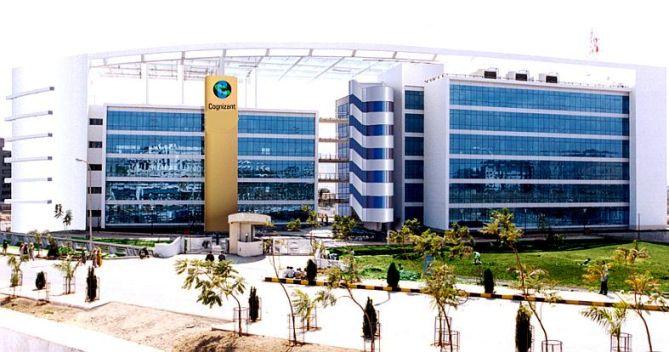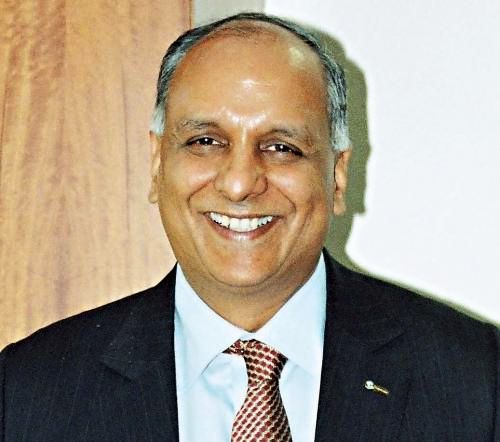Photographs: Cognizant/Wikimedia Commons T E Narasimhan in Chennai
Through the years, Cognizant has stayed ahead of technology changes, aligned itself with business shifts and embraced strategies that have changed the rules of the game. Cognizant India Executive Vice-Chairman R Chandrasekaran talks to Business Standard about the experience and the way forward.
Edited excerpts:
How have the past 20 years been for Cognizant?
Terrific.
In 1994, several hundred companies planned to leverage the global technology talent pool.
We are happy Cognizant converted the opportunity and made a big impact on client businesses globally.
We owe our industry-leading growth to three aspects: our client-centricity, disciplined focus on core industries, services and geographies, and our reinvestment of operating margins above 19-20 per cent back into our business.
. . .
'Today, volatility is the new normal'
Image: R Chandrasekaran.Photographs: Courtesy, Nasscom
How has the sector changed through the years?
At the beginning, it was largely about providing technology solutions to simple business problems.
Later, it transitioned to providing business solutions to complex problems and leveraging technology.
Through the years, Cognizant had continually stayed ahead of technology shifts.
We saw four key technology transformations -- mainframe, minis, distributed computing and internet -- and seamlessly rode each of these.
Today, we are in the midst of another technology transformation, one propelled by a confluence of social, mobile, analytics and cloud technologies.
. . .
'Today, volatility is the new normal'
Image: Cognizant office signage at Sector V of the Salt Lake City or Bidhan Nagar, Kolkata.Photographs: Biswarup Ganguly/Wikimedia Commons
What was the key lesson in this journey?
A key lesson was to remain relevant, enterprises must think fast and think forward. Employee and partner demands are increasingly converging, resulting in new dynamics; it is imperative to challenge conventional wisdom and look beyond.
In today’s business environment, volatility is the new normal.
That is why at Cognizant, we have continually reinvented ourselves.
The US has been a major contributor to revenue. Is it a good idea to depend on a single geography or has Cognizant de-risked itself?
We maintain focus on the North American market because it is the largest information technology market in the world.
Organisations there are aggressive adopters of technology and have more mature global sourcing programmes.
We are also investing in other geographies.
Europe, which contributes 18 per cent to our revenue, remains an attractive long-term market and we continue to make investments there.
Our growth in the rest of the world remains exceptionally strong, though with a smaller revenue base.
We are actively expanding in Latin America by complementing existing delivery centres with senior client-facing teams.
Recently, we expanded our footprint in the Americas, opening a delivery centre in San Jose, Costa Rica, Cognizant's fifth in Latin America and 15th in the Americas.
. . .
'Today, volatility is the new normal'
Image: A bank employee at work.Photographs: Lee Jae-Won/Reuters
How will the recent management changes help the company?
Progressive companies organise for the future and that’s precisely what we have done.
Many of the changes announced in December 2013 were promotions for senior leaders who had done exceptional jobs in growing Cognizant.
The changes were aimed at sharpening our focus on gaining mindshare and market share, driving best-in-class delivery excellence and creating a world-class business performance management structure.
How has the company’s acquisition strategy evolved through the years?
We continue to follow a ‘tuck-under’ acquisition philosophy, driven by three objectives -- expanding our geographic footprint, filling in gaps or strengthening our solutions spectrum, and strengthening our domain, consulting and analytics capability.
We continue to look for tuck-under acquisition opportunities that fit one or more of these parameters.
Our definition of tuck-under is up to $200 million, in terms of the target company’s revenue, the sweet spot being $20-80 million.
Central to Cognizant’s acquisition philosophy is our strategy of acquiring for ‘capability, not capacity’.
. . .
'Today, volatility is the new normal'
Photographs: Vivek Prakash/Files/Reuters
What sector trends does the company expect? How well equipped is it face those?
As enterprises increasingly focus on digital transformation of their operations, we expect the combination of economic shifts and SMAC technologies to create game-changing opportunities across the markets we serve.
We are uniquely positioned to stay relevant to our clients’ changing needs and provide increasing value. Our focus will continue to be on excelling in core services, while simultaneously investing in multiple growth horizons.
How do you see India as a market?
Our value proposition to the Indian market is slightly different, in terms of the services we offer.
While we have invested in a dedicated leadership and sales team, our approach is a lot more consulting- and domain-led.
In India, Cognizant brings to the table the rich experience of providing solutions to top global companies and thought leadership.
We undertake downstream opportunities in systems integration infrastructure outsourcing and knowledge process outsourcing.
Cognizant’s targets in the Indian market are Indian, as well as multinational corporations, along with the government.
We service several customers in India—about half of those are large Indian companies with global aspirations and the rest multinational companies with operations in India.






article